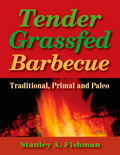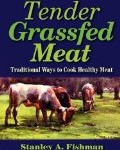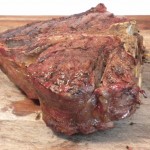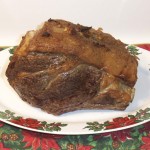The Elephant, the Blind Men, and Food Science
By Stanley A. Fishman, author of Tender Grassfed Meat and Tender Grassfed Barbecue
The United States established national nutrition standards in the early days of World War II. The reason for establishing these standards was simple, yet of great concern. Approximately 15% of potential military recruits were physically unfit for service.
The government correctly determined that the problem was malnutrition. Thus, the national nutrition standards were established, based on scientific research. These standards have been revised several times over the years, based on more scientific research.
American institutions, the medical profession, the nutrition profession, and society in general tried to follow these standards, and many people did.
The result? Today, in 2013, 75% of potential military recruits were physically unfit for service.
In other words, the percentage of recruits unfit for service has risen from 15% to 75%!
Since the purpose was to improve the health of military recruits, the national nutrition standards are a miserable failure, by any measure.
How could this happen?
The Dangers of Partial Information
The problem with food science is that it is based on partial information. There is much about food and how it interacts with the body that has not yet been discovered. Partial knowledge can be very misleading.
The problem was perfectly described in a very old tale from India, one that goes back thousands of years. There are several versions, but this one will do.
Six wise men, who had much knowledge, had never seen an elephant. All of them were blind. They went to examine an elephant to decide what it was. Since they were blind, they had to rely on touch.
One wise man fell against the side of the elephant, and stated that the elephant was like a wall.
The second wise man grasped the tusk of the elephant, and declared the elephant was like a spear.
The third wise man felt the squirming trunk of the elephant, and declared that the elephant was like a snake.
The fourth wise man felt one of the legs of the elephant, and stated the elephant was like a tree.
The fifth wise man touched the ear of the elephant, and declared that the elephant was like a fan.
The sixth wise man touched the tail of the elephant, and declared that the elephant was like a rope.
All of their conclusions were reasonable, based on the data they had, and all of them were wrong.
Before one can determine the truth of something, one must be able to perceive the whole of it.
Food science has never had more than partial information on food, nutrition, and digestion, and has come up with conclusions that are often wrong, because the data is partial.
An Example of How Partial Knowledge Leads to Serious Errors
Back in the mid-twentieth century, food scientists reached a consensus that saturated fat was bad for health, and unsaturated fat was good. Since most saturated fat came from animal sources, and most unsaturated fat came from vegetable sources, the scientists claimed that vegetable oils should be used instead of animal fats. This recommendation was adopted by the authorities and institutions, and most people adopted it as well.
But these scientists did not know of the existence of omega-3 fatty acids and omega-6 fatty acids. We now know that these acids must be in a particular ratio, one that occurs naturally in the fat of wild fish and grassfed animals. There is much scientific evidence that an oversupply of omega-6 fatty acids is very bad for the body, causing inflammation, and contributing to inflammatory diseases like heart disease, cancer, and many others. More omega-3 fatty acids are found in saturated fat, while unsaturated fat is made up mainly of omega-6 fatty acids. Most vegetable oils have far too many omega-6 fatty acids, and are out of balance.
The scientists who recommended vegetable oil over animal fats did not even know that omega-3 and omega-6 fatty acids existed, let alone how crucial the balance was. This is very much like the blind wise men and the elephant.
The harm that was created by this partial knowledge is immense, as there is no telling how many millions of people got serious inflammatory illnesses because they followed this bad research. We do know that the occurrence of these diseases has increased enormously over time.
For example, 3000 people died from heart attacks in the U.S. in 1930. But, in 2004, 876,000 people died from heart attacks in the U.S.
The Wisdom of the Ancestors—the Research of Dr. Price
I am not condemning valid, unbiased, well conducted scientific research. It can be invaluable. There is no doubt, though, at this time, scientific knowledge of food and its interaction with the body is only partial, and cannot be relied on in all areas.
But we have an alternative. Our ancestors (especially those peoples who were healthy) had cuisines and food combinations based on thousands of years of experience, passed down over the centuries from father to son, from mother to daughter. I try to eat according to these traditions, and to eat unmodified foods that were similar to what they ate. I have had great success, and so have most of the people I know who follow this path. Dr. Weston A. Price showed the way, with his study of traditional peoples who were free from tooth decay and modern disease, and we can follow his path.
This post is part of Fat Tuesday and Real Food Wednesday blog carnivals.
Sorry, the comment form is closed at this time.
Read more
« How You Can Help Save a Heritage Breed, the Guinea Hog
Roast Meat + Roast Vegetables = a Delicious One-Pan Meal »


 Photos of recipes from the new book Tender Grassfed Barbecue
Photos of recipes from the new book Tender Grassfed Barbecue
 Photos of recipes from the cookbook Tender Grassfed Meat
Photos of recipes from the cookbook Tender Grassfed Meat
